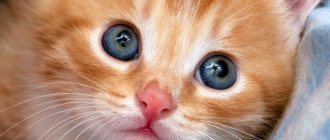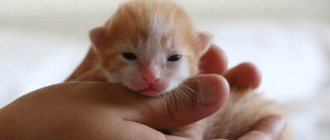Sleep norms for cats
When asking how much sleep a cat should sleep, you need to take into account a number of factors, and the first of them is age. Newborn kittens sleep all the time, interrupting only for meals. The duration of sleep for a baby at the age of 2–3 months can vary depending on the breed, temperament, home environment, etc. For example, cats have a calm temperament, so the kitten goes to bed as soon as it eats. For comparison, a cat or, even at a very young age, is very active.
What you need to know about cats sleeping?
It is useful to know not only how much cats sleep, but also how and why they sleep and what deviations there may be. This will help you better understand your pet and react faster in case of possible problems.
What to do if your cat snores?
When cats fall asleep, they may wheeze or snore. There is no need to worry if your pet wheezes or snores. Snoring itself is not a disease. For example, cats that belong to breeds with a short muzzle snore due to the structural features of the nasopharynx. These breeds include Persians, Exotics, Devon Rex, American Burmese, etc.
Snoring can be a symptom of other diseases. For example, overweight cats often snore. Snoring may indicate bronchitis, broken ribs, swelling of the larynx due to an allergic reaction, and even heart disease. You need to worry and visit a veterinarian if, in addition to snoring, there are also the following symptoms:
- partial cessation of breathing during sleep,
- loss of appetite,
- sneezing and coughing,
- swelling on the face,
- the cat is trying to breathe through its mouth.
Do cats dream?
Scientists have found that only mammals have a REM sleep phase. At this stage, the brain is very active, and the eyes move quickly. This stage of sleep is otherwise called the rapid eye movement phase. It is during this phase that we dream. Research confirms that the brain activity of different mammals is similar during REM sleep. That is, the brain activity of cats and people in this phase is also similar. This means that cats dream.
Why are cats active at night?
Many owners are angry because their pets prefer to be active at night. Many explain this by the fact that cats are nocturnal animals. In fact, this is not entirely true: cats are more likely to be crepuscular animals.
Often kittens that move to a new home do not come out of hiding until the early morning. This behavior is inherent in cats by nature. Cats see well in limited light, which is an advantage for them when hunting. That's why domestic cats, obeying instinct, get up in the pre-dawn hours.
What to do if your cat won't let you sleep at night?
Cats live according to a certain schedule, and this schedule can be changed so that your pet does not interfere with your sleep at night. This is quite easy to do.
- Give your cat something to do during the day. Especially if you spend most of the day at work. Provide your pet with toys, including interactive toys.
- In the evening, be sure to play active games with your cat. Simulate a hunt: chase a cat with a laser pointer or play with feathers with a fishing rod. Satisfy the hunter's instinct.
- Feed your pet at the same time, shortly before you go to bed. Since cats are obligate carnivores, the best food for them is food based on fresh meat, for example, SUPERPET. Such food is well digested, and the cat is satisfied.
- A well-fed and well-fed pet will relax and begin to wash itself. This is part of its natural cycle, which we talked about at the beginning. After washing, the cat will go to bed.
If your cat wakes up during the night and demands your attention, ignore it. You can’t not only stroke or feel sorry for the cat, but also scold it. Any reaction from the owner is attention. If you encourage nocturnal behavior, even with disturbances, your cat will continue to bother you at night.
Remember that age also plays a role: kittens are often active at night, they do not yet have an established routine. You just need to endure this period, but from childhood you should be accustomed to the fact that no one pays attention to your pet at night.
When should you worry?
Now you know how much cats sleep on average. But what if your pet sleeps longer or shorter? Each cat is individual, and each animal’s sleep standards are also different. If your pet always sleeps for about 17 hours at night, most likely this is his norm.
You need to worry if your cat sleeps longer than normal and at the same time becomes weakened and apathetic. Such symptoms may be signs of arthritis, diabetes, or infections.
If your cat sleeps less than normal, this may indicate pain. At the same time, the cat becomes restless and may lose appetite. In this case, you should take your pet to a doctor to rule out injuries and other health problems.
Changes in sleep duration are not always alarming signals. Cats sleep less if the amount of food they eat decreases. This can happen if your pet is obese and you have reduced his portion to control his weight.
Many people think that cats sleep a lot because they are lazy. Now you know that this is not true. The behavior of cats is due to their predatory nature. Your cat's long sleep is not a sign of laziness, but another evidence that a real small predator lives in your home.
Did you like the article? Tell your friends:
Comments
Sleep disorders
The most important risk factor to rule out first is lack of sleep due to anxiety. Cats are very mysterious, but primitive in their needs, they need peace, security, warmth, food, exercise, and if the cat is not a mating partner. By the way, if your pet is not of breeding value, it is recommended to castrate (sterilize) it. It has been proven that cats that do not experience hormonal stress live longer and get sick less often.
So, how long does a kitten sleep? It is impossible to answer this question unequivocally. A newborn kitten sleeps on average 23 hours a day, interrupted only when eating. The older the kitten becomes, the greater its motor activity, the shorter the period of sleep becomes, reaching the age of an adult cat by the age of 4–5 months.
What determines the duration of sleep? In the regulation of falling asleep and sleep duration, three components are decisive:
- hormonal, which depends on the age and gender of the kitten;
- environmental, which is determined by environmental influences and nutrition;
- neurological, defined by nervous calm or, on the contrary, excitement.
Based on this data, we can understand what can influence the length of a kitten's sleep. Thus, hormonal levels increase as we grow older and decrease as we age. This is why older cats also sleep a lot.
A cat, even a domestic cat that never goes hunting, still remains a predator. And like any predator, she is most active while she is hungry, and goes to bed when she is full. By the way, an overly active and noisy kitten most likely does not receive the required amount of food. And if you observe such behavior in a kitten quite often, then you need to think about its diet.
If you had a cat with kittens at home, you probably noticed that kittens fall asleep immediately after eating near their mother’s belly. And this is no coincidence. Temperature is one of the determining factors of sleep. The warmer the kitten is, the faster and more soundly he falls asleep. And this also has a logical explanation: after all, in this situation, the loss of heat, and therefore energy, is minimal, and the kitten can afford to sleep peacefully.
For an attentive owner, observing a sleeping kitten can tell how well the pet is in the house
A kitten's sleep also depends on its psychological state. If the environment is calm, there are no sharp sounds in the house, then the kitten feels safe - he can sleep as much as he needs. A nervous environment stimulates shallow, restless sleep. By the way, this problem can be solved by special soft beds that have a calming effect on the kitten, or cozy houses closed on three sides that give a feeling of security.
Why does a kitten need sleep? Like any living creature, a kitten uses a period of activity to accumulate experience, and during sleep not only the muscles and brain rest, but also the information received during wakefulness is “processed” and memorized. Therefore, a combination of active games, communication with the kitten while awake and good sleep will help you raise an intelligent, mentally balanced animal.
Scientists believe that cats dream during deep sleep. This is also evidenced by the behavior of a deeply sleeping kitten. He can meow and move his paws. It is believed that dreams of a kitten that feels protected and confident are associated with hunting, chasing and playing. If the kitten feels itself in a hostile environment, then the dreams are associated with defense and attempts to hide. For an attentive owner, observing a sleeping kitten can tell how well the pet is doing in the home.
A cat needs about 16 hours a day to sleep - so frequent and long sleep breaks are the norm for cats. Kittens spend even more time sleeping, especially during breastfeeding. The first days after birth, animals sleep almost all the time. Sleep duration shortens as kittens open their eyes and begin to explore the world around them. After the start of self-feeding, the duration of sleep becomes even shorter and by six months the kitten gets enough sleep in 15–17 hours.
Normal sleep duration for a kitten
Newborn kittens can sleep 22–23 hours a day, then the duration gradually decreases. By 1–2 months, the pet spends about 18 hours sleeping, and the rest of the time is spent playing, exploring the world, eating and going to the toilet. By 4–6 months, the kitten adjusts to the routine of an adult animal and sleeps for 14–16 hours.
The quality of sleep directly affects its duration, so the animal should have a quiet place for privacy where it can feel safe. If the kitten is constantly tense or frightened by something, then he will sleep all day, but still remain lethargic. This may cause future illnesses.
Tips for keeping and caring for a kitten
The normal sleep duration for an adolescent cat is 18-19 hours a day.
- Satiety. If a cat does not know how to eat in moderation and is constantly fed, it can sleep for a long time after each meal - up to 20 hours a day.
- The degree of calm of the animal. In a stressful situation, a cat may not sleep at all. This is caused by fear for one’s life and self-defense. In such cases, it is necessary to find out the cause of stress in a mustachioed pet. Otherwise, harm to health is inevitable. When the stress has already been endured and the animal returns to its usual rhythm of life, the number of hours of sleep per day can increase sharply. This is due to fatigue from strong experiences. Over time, sleep will return to normal.
- The period of pregnancy and breastfeeding. A pregnant cat should sleep more than usual. The norm is 18-20 hours. Increased sleep occurs due to greater energy expenditure for bearing and feeding kittens.
- Postoperative period. During sterilization, the cat is put into a state of deep sleep using general anesthesia. After the operation is completed, the cat can leave the room for up to 24 hours. Drowsiness will be increased and periods of wakefulness will be insignificant.
- the hunting instinct is still quite poorly developed, and therefore kittens willingly rest throughout the night;
- A growing body needs a huge amount of energy. After all, it is known that kids spend almost all their free time playing games and playful fights among themselves. The activity is high, energy is consumed very quickly, and accordingly, more time is needed to restore it.
So how long do cats sleep? On average, they spend about 14-17 hours a day sleeping. That is, it turns out that only a third of their life they are in a cheerful state. This amount of time may increase or decrease slightly depending on how often the cat is active, which requires interaction with someone. If there is no one nearby, then she will sleep.
Over the years, adult animals develop a certain schedule, and every day they spend approximately the same amount of time sleeping. But if you notice that your pet has begun to sleep less than usual, then it is advisable to consult a veterinarian.
There is still no exact answer to the question of why cats sleep a lot. There is a version that this is in some way connected with their hunting instincts and twilight lifestyle. In the wild, representatives of the feline world usually go hunting after dark. This is explained by the fact that they feed on small rodents, which are often very difficult to catch during the day, when they are especially active. And at night, potential prey, as a rule, sleeps, and accordingly, the chances of feasting on it are much greater.
It turns out that cats need to sleep a lot during the day - this way they can accumulate enough energy for night hunting.
Domestic cats have to some extent retained ancient instincts - they are indeed more active in the twilight time, but this does not mean that our pets are awake all night. They sleep with us, and in the morning we see them active again, as the already acquired instinct is triggered - to get their portion of breakfast before the owner leaves for work.
Kittens
If we talk about young cats, they need a slightly longer amount of time to sleep than adults. In this case, the reason for this is two circumstances:
Although adult cats often sleep in rather surprising positions
Factors affecting the quality of sleep in an animal
Three groups of factors influence the length of an animal’s sleep:
- 1. Neurological. They are determined by the emotional and nervous state of the cat (for example, whether it is calm or excited).
- 2. Hormonal. Depends on the gender and age of the kitten.
- 3. Environmental. They take into account the influence of the environment and the animal’s diet.
The combination of three factors determines the required duration of rest. The main thing is that nothing disturbs your pet at this moment, otherwise he will need more time to get a good night's sleep.
Why do pets sleep so much?
Interestingly, experts still have not determined exactly why cats sleep so much. One explanation is the lifestyle of their ancestors. Wild felines are solitary predators; they hunt for prey and then rest.
In general, the same can be said about a pet. He is most active when he is hungry and goes to bed after satiation. Therefore, if you notice that the kitten is loud and restless, perhaps he simply does not have enough food or is cold.
Also, a hormonal component is involved in the regulation of sleep, depending on the gender and age of the kitten. A young adult animal in its prime needs less rest than kittens or older pets.
Malnutrition, cold, illness and stress can generally deprive a cat of sleep. Therefore, it is important to create optimal conditions for your pet, because sleep restores strength and helps to be healthy.
By the way, some experts believe that cats dream in the deep phase of sleep. Sometimes owners may notice that in their sleep the pet moves its paws, eyes and even meows.
Sleep phases in cats
Every owner has noticed that the animal twitches its paws or quickly moves its eyeballs in its sleep. Sometimes a pet, on the contrary, sleeps extremely lightly and checks its surroundings at every rustle. It depends on the phase that is occurring at one time or another.
- 1. Nap. The initial stage of sleep or short-term rest of the animal. During this period, the cat relaxes its muscles, but does not lose vigilance; the pet hears, perceives and smells everything perfectly. During a nap, a cat is ready to defend itself or attack at any moment. This stage takes most of the time.
- 2. Shallow sleep. Characterized by relaxation of muscles and active division of tissue cells. The cat's brain begins to work at a faster pace, the animal does not perceive odors, but still hears sensitively.
- 3. Deep sleep. The stage of complete relaxation of the cat's muscles. You can notice sharp twitching, they arise due to nerve impulses. At this stage, her immune system works as actively as possible.
- 4. REM phase or rapid sleep. The period when the animal dreams. During the REM phase, the cat actively moves its eyeballs, which is its hallmark. This phase is the shortest and can last only a few seconds. The animal’s self-preservation instinct does not allow it to remain in REM sleep for a long time, since during its period the pet’s muscles are completely paralyzed.
For most of the rest, the animal simply dozes, which does not allow it to regain strength quickly, so the pet needs a lot of time to sleep. If the kitten sleeps for a long time, eats well, gains weight and feels alert after waking up, there is no need to worry. If there are other suspicious signs, you should contact a specialist to find out the cause.
Reasons for a kitten's long sleep
The kitten needs to get enough sleep, since its body is not fully strengthened, and it requires a lot of energy to explore and adapt to the world around it.
If your pet sleeps a lot, you need to pay attention to the environment during his rest. Perhaps due to noise, stress, a new place and other factors, the kitten is unable to relax and sleep normally. If he constantly naps, then this is simply not enough to gain strength, so the pet will be lethargic and constantly half asleep.
It is necessary to organize a sleeping place for the kitten in the quietest and farthest corner of the house. Children should not be allowed to disturb or frighten an animal in its sleep. Once the kitten can get a good night's sleep, the total amount of rest time will be reduced. If you can’t cope on your own, you need to go to the clinic.
Reasons why a kitten sleeps for a long time:
- Painful sensations. It takes a long time for your pet to choose a place and lie down comfortably; he constantly tosses and turns. You can find out where it hurts with careful palpation.
- Frequent visits to the litter box. This is a consequence of problems with the kidneys and urinary system.
- Neurological disorders. As well as severe excitability, stress, fear, noise, etc.
- Hunger. If a kitten's food is not calorie-calculated, then it is not getting enough nutrients.
Sometimes a kitten sleeps constantly due to health problems. Long rest is required when:
All diseases have noticeable symptoms, but they may not appear immediately, which complicates the situation.
Adult animals and kittens are sensitive to the weather, so on a rainy or cloudy day they will prefer to spend more time in the lounger. A cat can constantly sleep simply out of boredom and laziness, this rarely applies to kittens, but it’s worth trying to actively play with your pet during the waking period - perhaps this will help him sleep well next time.
A kitten's prolonged sleep should not cause concern to owners if the pet eats well, gains weight and spends time actively after waking up. If there are any other symptoms or ailments in the animal, it is necessary to show it to a veterinarian to diagnose and solve the problem.
Cats are rightfully considered real sleepyheads - an axiom that does not require proof. It seems that these pets are ready to stay in a half-asleep state for days. Let's calculate how many hours a day cats sleep, and whether this is harmful to their health.
Why do cats sleep a lot?
Many people know that any cat spends most of its life sleeping. Scientists have calculated how many hours cats sleep per day. On average, our little brothers are willing to spend from 16 to 20 hours a day on their favorite activity, which is almost 80% of the time.
Moreover, there are no gender differences in this addiction - cats sleep as much as cats. Only possums and bats can compete with them in their passion for prolonged passive rest.
The reason for this behavior is explained by animal physiology. Any representatives of the cat family are predators by nature, although due to evolutionary changes and domestication, many of them have lost the behavioral traits characteristic of predators, they have retained the desire to accumulate strength. Like any predator, a cat is active while it is hungry, and passive when it feels full.
They show maximum activity during hunting hours - this is the twilight period at sunset and dawn. In a short time, they expend a huge amount of energy in order to catch up, grab and kill their prey. The cats spend the rest of their time recuperating and preparing for the next run.
One of the reasons why cats sleep for several hours during the day is simple boredom. These very smart and inquisitive animals need a “change of scenery” and new experiences. Living in a house where the environment does not change so often, animals quickly become bored. And the best way to “escape reality” is to get a good night’s sleep.
But as soon as the cat senses a sound that is interesting to him, he is able to jump up at any moment, as if he had not slept at all, in order to take a direct part in the action.
Dream in the life of cats
Zoological studies on how many hours a day cats sleep , which were carried out several years ago, indicate that adult cats can sleep up to twenty hours. They spend the rest of the time eating and satisfying other natural needs. Two-month-old kittens are already much more active than their younger counterparts. Fluffy babies can sleep throughout the day, and for them this is the absolute norm. Such a baby can wake up only if he gets hungry. Having eaten its mother's milk, the kitten falls asleep again.
At two months, the pet is already actively moving, crawling around its mother, it wakes up even when she is not around, and the time that has passed since the meal is not at all that significant. Well-fed kittens are ready to explore the world; they want to play and be naughty.
How long should a kitten sleep?
Newborn kittens sleep almost day and night. They wake up only to be thoroughly nourished with their mother's milk. Deep sleep is a sign of a full stomach. The easiest way to determine whether babies have enough food is by their behavior:
- if after eating the meal the fluffies fall asleep calmly, there is no need to worry;
- if they crawl to the sides and squeak, there is not enough milk.
After observing the kittens, you will notice that they fall asleep immediately after eating, directly next to the warm belly of the mother. The main reason lies in the temperature being comfortable for kittens. The warmer the kids are, the faster they fall asleep. And since in this situation the loss of energy is minimal, the kittens can afford to sleep peacefully and soundly.
Closer to the first month of life, babies become more active: they play with pleasure and explore the area. During this period, they sleep several hours less. By the age of 4-5 months, stronger kittens reach the regime of their adult relatives.











